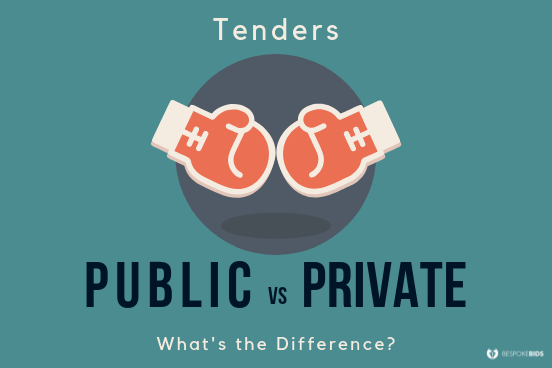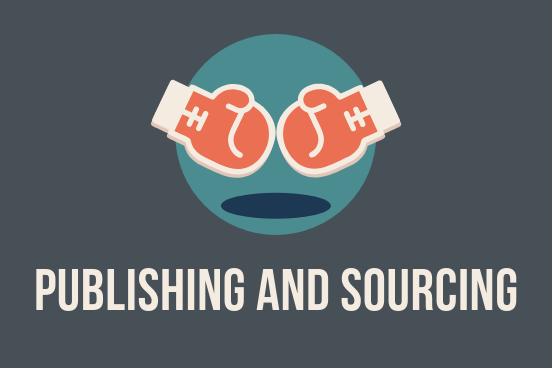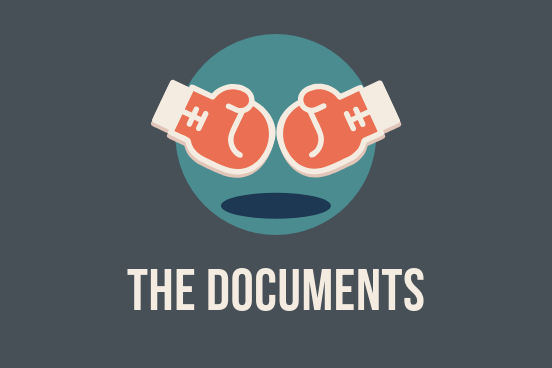
As anyone who is regularly involved in the tendering process will know, there are some quite significant differences between public and private sector tenders. In this article we compare the differences and similarities in tendering between these two sectors.
Public vs Private: Process

Traditionally, public sector tenders were split into three distinct stages.
- Expression of Interest (EOI).
- Pre-qualification Questionnaire (PQQ).
- Invitation to Tender (ITT).
Private sector tenders, on the other hand, also roughly have these stages, but have preferred to use acronyms beginning with “R”, and any number of other alphabet-soup combinations besides:
- RFI – Request for Information.
- RFT – Request for Tender.
- RFQ – Request for Quotation.
- RFP – Request for Proposal.
- RFO – Request for Offer.
In recent years, the line between the two process has blurred somewhat. Public sector tenders now effectively merge EOIs and PQQs into a single Supplier Questionnaire (SQ). You also occasionally see further spill-over in acronym usage between the sectors.
Public vs Private: Publishing and Sourcing Tenders

An obvious difference between the two is that there are simply far more public tenders than there are private ones.
Private tenders are also usually much harder to source. This is to do with the different procurement rules that apply in the two sectors.
Public
By its very nature, the public sector is open to public scrutiny. All public sector contracts must therefore be put out to tender. Depending on the values involved, public sector contracts must also be advertised in the Official Journal of the European Union (OJEU).
Private
In the private sector on the other hand, tendering of any form is not obligatory. A private company may already have suppliers it regularly uses. They will negotiate with them directly for the delivery of the services they provide. But where a potential contract does go out to tender, it is very rare for a private company to invite the world to bid for it. Instead it will typically already have a handful of suppliers it will go to for a quote, or the invitation will go to the BDMs or sales managers who happen to be in contact with them.
There is no obligation in private sector procurement to offer suppliers an equal chance. Indeed, one of the hardest things to do for anyone bidding in the private sector is to determine whether the opportunity is actually real, or whether the buyer is simply using the tender process to put pressure on its incumbent supplier to lower its prices. Quite often in such cases, the private buyer has no intention of changing suppliers as they don’t want the upheaval that’s likely to occur to the network of relationships that have built up over the years.
This is not allowed in the public sector. We do occasionally see market engagement events, but their intention must always be made plain. If a tender is cancelled mid-process, bidders must be given written explanations.
Public vs Private: Feedback

Bid feedback highlights several marked differences between the two sectors. Public sector procurement rules, enshrined in various EU directives, oblige public sector bodies to provide clear explanations on how the tender will be assessed and then to provide some sort of (hopefully meaningful) feedback to bidders. Private companies, on the other hand, have no such obligation. They are more often than not reluctant to explain how they chose the successful bidder.
Public vs Private: The Documents

The types of questions the tender documents ask also highlight differences between the two sectors
With a 50-year history of procurement regulations, and a process of continuous tendering, the public sector has developed a series of standard-type questions. For example, the Standard Selection Questionnaire has now completely replaced the pre-qualification stage with a set formula of standardised questions
ITTs in the public sector then revolve around processes and how you plan to deliver the service or product.
Private companies meanwhile, have developed their own internal set of “unregulated” questions. Private tenders are more likely to insert “touchy-feely”, sometimes philosophical type questions. They may ask about your mission statement and company ethos, or even very bluntly who your biggest customers are. It is rarely clear why they ask these things when ultimately price seems to carry most weight anyway.
Conclusion
Whether you bid for public or private tenders will most probably come down to the type of service you provide. If you offer educational or healthcare services then 90% of your tenders will be public sector. On the other hand if you work in B2B services, or corporate software, you will probably find yourself in the private sector. Services such as cleaning and security can work in both sectors.
Make a note of where your own company might fall before you start looking in the wrong place. Alternatively, give us a call on 0161 883 1836. We’d be happy to advise on how you should source your next tender.
Did you enjoy this post?
Click here to learn more about finding new contracts.
Follow Bespoke Bids on Linkedin to keep up with our day-to-day operations. We post live tenders, tips and tricks and more.


